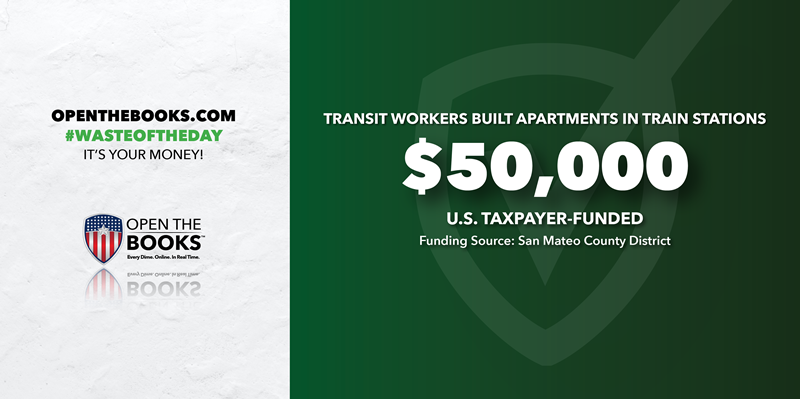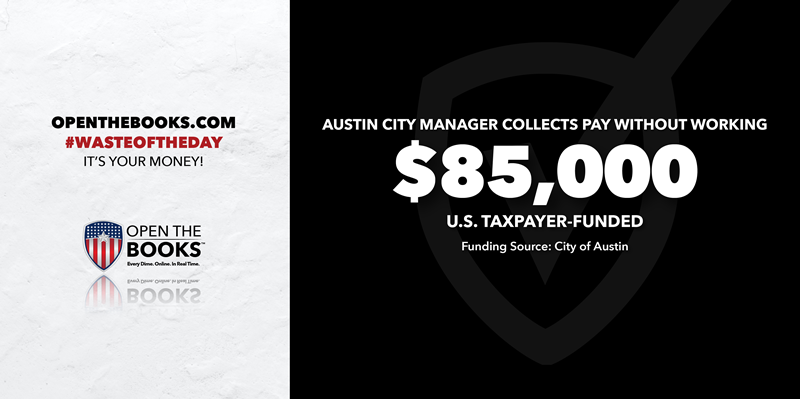
San Fran Train Workers Built Secret Apartments on Taxpayers’ Dime
April 22, 2024

Topline: Two former California transit employees used $50,000 of taxpayer moneyto build secret apartments inside two train stations, allegedly for their own personal convenience.
Records at OpenTheBooks.com revealed that at least one of them collected almost $1.1 million in taxpayer-funded salary between 2017 and 2021.
Key facts: Deputy Director of Operations Joe Navarro and Station Manager Seth Worden installed showers, heating systems, security cameras and more in two closed-down offices in the San Francisco area, according to the Mercury News.
They were both fired in the past for living in the train stations, but it’s only now that the taxpayer cost is coming to light.
Both men had homes of their own. The district attorney speculated to the San Francisco Standard that the apartments were built so they wouldn’t have to commute each morning.
The two employees are accused of misuse of public funds. Navarro pled not guilty — he says a felony charge is not appropriate — and Worden has not been arraigned as of early April. But there’s no denying that the $50,000 was spent.
Neither train station is currently in use by the rail line Caltrain, so the apartments went unnoticed.
Authorities say Worden hired contractors for the renovations and Navarro approved the payments.
Each invoice was for less than $3,000. Prosecutors believe that was intentional, since larger payments require higher approval.
Background: Living in a train station is odd enough, but it’s even stranger given that taxpayers were already giving Navarro a healthy salary.
Navarro was one of the highest-paid employees in the San Mateo County District. He made more than $231,000 in 2021, more than all but eight of the county’s 703 employees.
He was fired in 2022 after an anonymous tip accused him of living in the train station, but that didn’t take away his retirement benefits; Navarro collected a $1,425 monthly pension that same year.
Worden worked for a contractor hired by Caltrain, so his salary is not subject to public disclosure.
Supporting quote: Worden’s attorney told NBC Bay Area, “I can tell you that my client is very remorseful for his role. I can further tell you that my initial sense of the case suggests that his participation would not suggest a felony prosecution appropriate. Again, I anticipate receiving the discovery in the coming days, and can glean a better context for his role in the case.”
Summary: Perhaps the real question here is how the employees managed to furnish their apartments for $50,000 when the federal government routinely spends more on affordable housing. Navarro and Worden will likely face prosecution, but they could still probably teach the government a thing or two about efficiency.
China Still Owes Over $1 Trillion to American Bondholders
April 23, 2024

Topline: The Chinese government refuses to repay over $1 trillion of decades-old bonds held by private American citizens, even though the U.S. is still making payments on its more than $850 billion debt to China, according to a recent op-ed in The Hill.
Key facts: The Republic of China financed huge infrastructure projects in the early 20th century by issuing bonds to investors and governments around the world.
The Chinese government fell behind on its bond payments in 1938 while at war with Japan. Before they could fix the error, it was overthrown by the current communist regime and the People’s Republic of China was formed.
The current Chinese government argues that it is not responsible for repaying the previous government’s debt, leaving over 20,000 Americans with worthless bonds.
The U.K. solved this problem in 1987 by threatening to cut off China’s access to British stocks and bonds if China did not repay its debt.
America has yet to take similar action. The Heritage Foundation’s Andrew Hale wrote in The Hill that’s because U.S. leaders always assumed China would eventually westernize and start repaying the bonds, but that has yet to happen.
Hale says the U.S. government should purchase the Chinese bonds from American citizens and then pass legislation forcing China to repay the debt. The bonds could then be used to offset America’s debt to China.
Background: China owned $859.4 billion of U.S. Treasury bonds as of August 2023.
Last year, OpenTheBooks.com and Sen. Joni Ernst uncovered $490 million of U.S. taxpayer money sent to the Chinese government and private companies through grants and contracts since 2017, meaning America is actually borrowing money from China just to send it back.
Last December, Ernst sponsored legislation that requires the Pentagon to audit the last 10 years of U.S. defense money sent to China and to virology labs around the world. A report must be filed to Congress by June.
Critical quote: “This failure to act needs to end now,” Hale wrote of America’s reluctance to strongarm China on its bond payments. “Given that relations with China have deteriorated and there is bipartisan agreement on the threat from China, this matter can finally be acted upon by both Congress and the Biden administration. Getting settlement on this defaulted debt is not only right and just for the bondholders but, if done correctly, could also be a huge win for the U.S. taxpayer."
Summary: The U.S. was dangerously close to defaulting on its bond payments to China last year. It’s time for the federal government to explore all avenues of lowering that debt and doing right by its taxpayers.
Freedom Caucus Earmarked $957 Million Since 2023
April 24, 2024

Topline: The ultra-conservative House Freedom Caucus opposed this year’s $1.7 trillion federal budget, urging lawmakers to vote against the bill and trigger a government shutdown because it was “loaded with hundreds of pages of earmarks.”
What the Freedom Caucus failed to mention is that its own members and allies have earmarked $957 million over the last two years.
Key facts: A recent OpenTheBooks report found that the average Freedom Caucus earmark in the last two years cost taxpayers $4.6 million — more than double the average for the rest of Congress.
In total, 22 Caucus members and allies filed 210 earmarks, with 27 others abstaining from the practice that often funds wasteful and corrupt pet projects in politicians’ home districts.
The full database of earmarks can be viewed here.
The Freedom Caucus was founded on fiscal conservatism, but its members earmarked more money than “The Squad,” a group of eight progressive Democratic House members.
The 22 Caucus members who filed earmarks got an average of $23.1 million this year. The average Squad member brought home $13.9 million.
In fact, Rep. Randy Weber (R-TX) singlehandedly earmarked more than The Squad. He secured $432 million over two years before he was kicked out of the Caucus this March for missing too many meetings.
Last September, Weber posted on social media that “We MUST cut the woke & weaponized spending of the federal gov & we should be reining in the out-of-control spending.”
Rep. Clay Higgins (R-LA) requested money for his alma mater Louisiana State, and Rep. Ronny Jackson (R-TX) sent money to West Texas A&M, where his son attends school.
Other questionable projects included $190,000 to test shark repellent from Rep. Greg Steube (R-FL) and Rep. Morgan Griffith’s (R-VA) $505,000 earmark to help medical students buy fake corpses.
Griffith also requested $500,000 to build an elevator in the Birthplace of Country Music Museum, even though Republicans recently banned earmarks for museums.
Background: This year’s federal budget contained 8,051 earmarks worth $15.7 billion.
Earmarks were banned for 10 years but were reinstated in 2021 by both parties, despite concerns they could still be used for personal political gain.
At one point last summer, the top 63 earmarkers in the House were all Republicans.
Supporting quote: Several Freedom Caucus members defended their earmarks in statements to the New York Post.
Rep. Keith Self (R-TX) defended his earmarks by saying that “Funding for our mental health initiative [at Texas A&M University] is important. But it made no sense to support legislation filled with woke programs and pork barrel spending when America is nearly $35 trillion in debt.”
Rep. Ronny Jackson reached out to us and denied membership. However, he accepted endorsement and $10,000 in funding from the House Freedom Caucus PAC when elected.
Summary: The Freedom Caucus presents itself as the antithesis of government spending, but its own members couldn’t resist partaking in this year’s pork barrel.
Throwback Thursday: San Diego Schools Misuse Millions in Grant Money
April 25, 2024

Throwback Thursday!
Topline: An instance of San Diego Unified school district spending a $3 million federal grant on employee bonuses instead of low-income students was just the start of a trend for San Diego schools diverting state and federal funds towards educators’ bonuses and gifts.
The late U.S. Senator Tom Coburn, the legendary U.S. Senator from Oklahoma, cited the $3 million misspending in his Wastebook 2008.
Coburn earned the nickname "Dr. No" by stopping thousands of pork-barrel projects using the Senate rules. He included projects that he couldn't stop in his oversight reports.
Coburn's Wastebook 2008 included 65 examples of outrageous spending worth more than $1.3 billion, including the $3 million wasted in San Diego — $4.4 million in today’s money.
Key facts: San Diego Unified school district added new perks to its pension plan in 2003 to convince aging teachers and principals to retire. The plan was projected to save the district money by forcing out its highest-paid employees.
It worked too well. Pensions were so high that almost 1,500 school workers retired in one year, leaving the district scrambling to pay for the benefits.
In a questionable display of logic, officials used federal grants meant to support low-income students and provide free lunches. They also money from anti-drug programs and HIV/AIDS education to pay retirees.
Federal auditors told San Diego Unified in 2008 to reinvest the money into a national fund for low-income students, but it’s unclear whether the school actually did.
What is clear is that the incident was just the start of San Diego Unified’s spending spree.
Background: In May 2012, state auditors found that the school district had billed $4.5 million of custodial costs to its free lunch program, which was 79% funded by the federal government.
A separate state report that same year found another $13.4 million taken from the same school lunch fund — mostly to pay employee salaries — and demanded repayment.
San Diego Unified denied wrongdoing in both instances.
Not long afterward, the district came clean about more corruption: officials were using free lunch funding to buy gifts for cafeteria workers to encourage “good attendance.” The schools had used $300,000 over 12 years but graciously promised to stop doing so.
When school officials actually did spend money on students, they still managed to drop the ball. In 2009, San Diego Unified spent $2.7 million of a federal grant on preschool staffing but forgot to file reimbursement paperwork. The public didn’t even find out until 2011.
While this malfeasance was going on, 57% of the district’s students were not meeting state standards in math scores and 46% were behind in English.
Summary: Students at San Diego Unified may be struggling with limited resources, but at least the district’s employees seem to be enjoying themselves.
Texas Administrator Covertly Received $85,000 After Retiring
April 26, 2024

Topline: The assistant city manager in Austin, Texas stopped working four months before his retirement but kept collecting his taxpayer salary anyway, netting $85,000 at the end of last year.
Key facts: On September 1, 2023, Austin announced in a memo that Assistant City Manager Rodney Gonzalez would retire “effective in January,” implying that Gonzalez would keep working for the rest of the year.
In reality, Gonzales stopped working that September. The city placed Gonzalez on paid administrative leave, allowing him to keep collecting his salary until January, according to city records provided to OpenTheBooks through a public records request.
Gonzales made almost twice as much per month as Texas Gov. Greg Abbott despite being on leave.
Auditors at OpenTheBooks.com discovered the payments through the records that revealed $12 million in paid administrative leave spending in Austin from 2021-2023. Paid leave is used for employees who are not working for reasons like jury duty or a disciplinary investigation.
When reached for comment, city officials said only that, “It was part of the agreement between Gonzales and the City to assist during the transitionary period.”
Records revealed three other Austin employees who collected more than $100,000 while on paid leave and 83 people who spent more than 100 days on leave since 2021.
That includes the first-ever director of the city’s Office of Civil Rights and the former head of Human Resources.
Background: The city manager’s office has been at the center of Austin’s taxpayer waste for some time now.
OpenTheBooks found last year that former City Manager Spencer Cronk earned nearly $1 million in a single year, including salary, benefits and severance pay, when he was fired in 2022,
This February, video leaked of Bozeman, Montana City Manager Jeff Mihelich discussing Austin’s attempts to recruit him to replace Cronk. He called Austin “stupid” — among other words not fit to reprint — for offering candidates a very high salary of $475,000, plus allowances for a car, house and more.
The city never returned OpenTheBooks’ request for comment on the accuracy of Mihelich’s statement.
Mihelich was put on paid leave by the Bozeman City Commission for mocking the waste of public money. Ironically, his severance package ended costing Montana taxpayers $172,000.
Summary: Taxpayers are on the hook for paid administrative leave in most U.S. cities, but funding an administrator’s secret early retirement is anything but normal.
The #WasteOfTheDay is presented by the forensic auditors at OpenTheBooks.com.